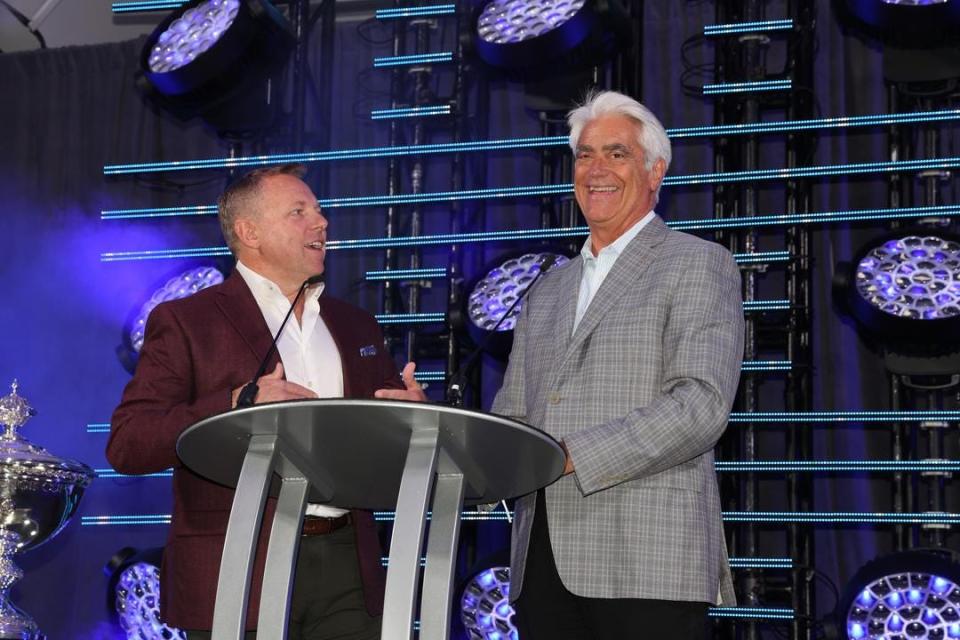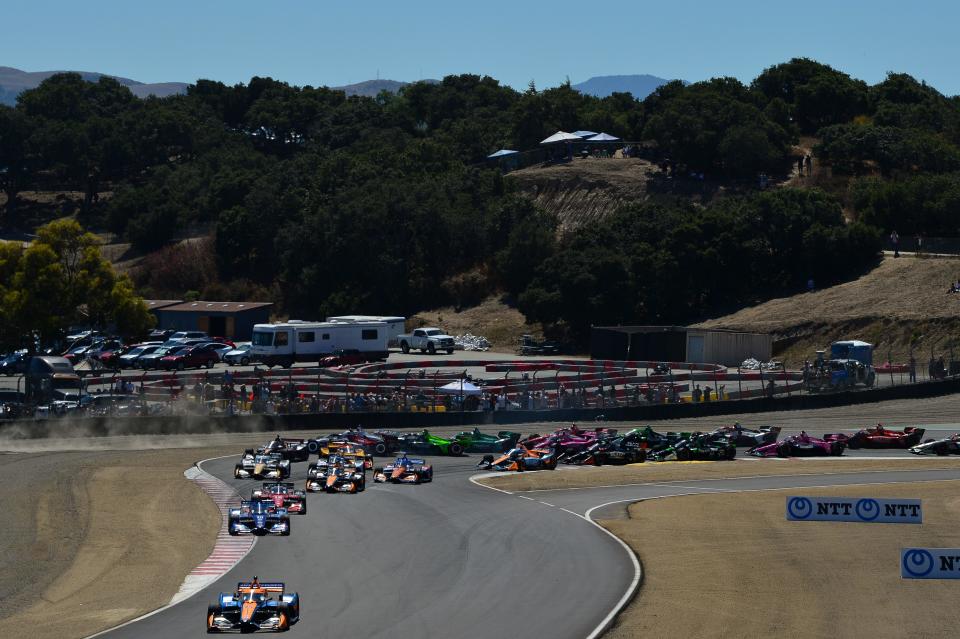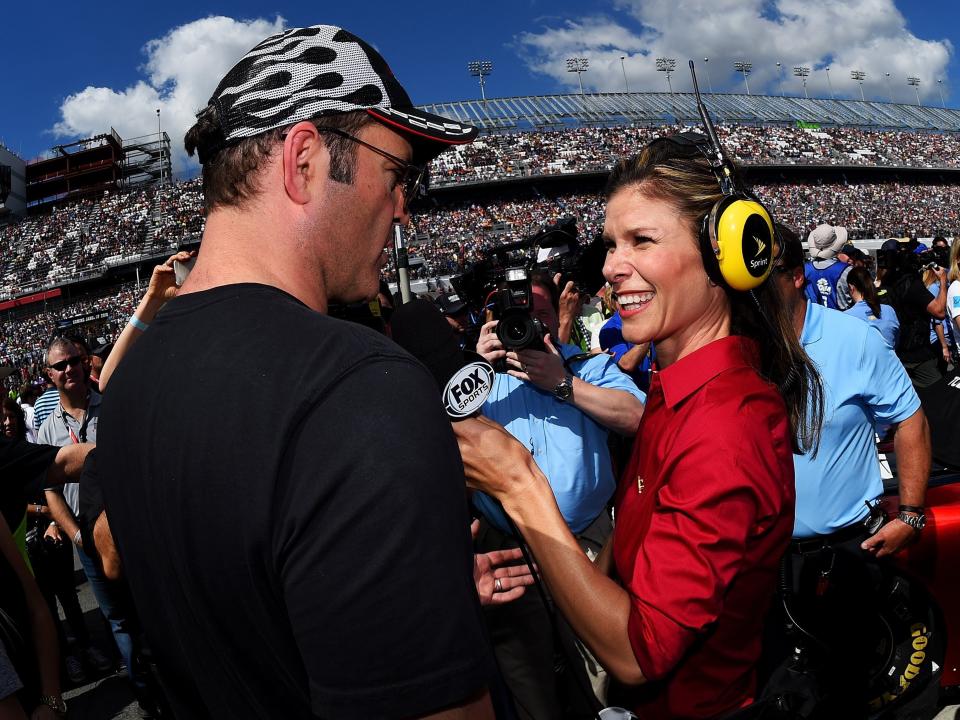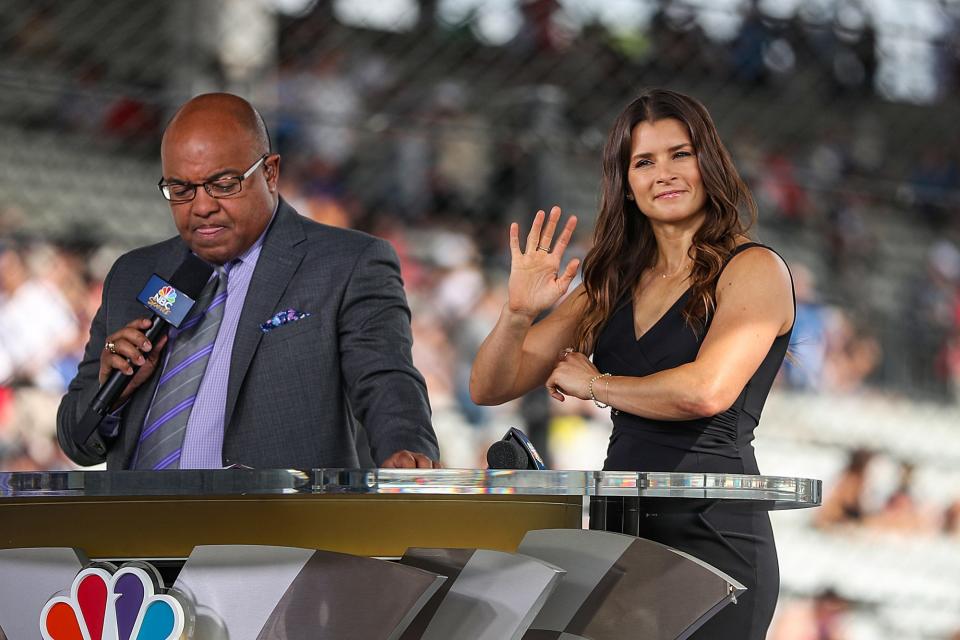Negotiations for IndyCar's next TV deal have come down to two heavy-hitters: NBC and Fox
Significant change could be coming to IndyCar’s broadcasting rights. There's a challenger, and it's not merely a ploy to squeeze a few extra dollars out of NBC executives.
Multiple series sources still remember the date – May 11, 2021 – when the Sports Business Journal report came out with an unmistakable headline: ‘NBC likely walking away from IndyCar’. The story included a line that both sides were “beginning to envision life without the other.” Just more than two months later, IndyCar and NBC signed a second exclusive three-year deal.
That’s the kind of rapid 180 that can take place as media rights negotiations get down to the wire. Entering this season, multiple sources told IndyStar that Fox had all but signed on the dotted line, leaving NBC with a lame duck season. The same sources now say situation has floated closer to a 70-30 or 60-40 split in favor of Fox, in the weeks since St. Pete.
Penske Corp. executive vice president of marketing and business development Jonathan Gibson told IndyStar on March 1 that talks remained open with as many as five of the eight media companies that series leadership took meetings with. But multiple series sources have long seen this as a battle between NBC and Fox.

“The most important part is competition,” Penske Entertainment Corp. president and CEO Mark Miles told IndyStar last September. “It doesn’t matter what the model says; we’ll get more (money) if there’s heated competition for our rights.”
According to some with connections to the talks, NBC remains alive – with the understanding that IndyCar has been offered as many, if not more, network windows than the 10 lined up for 2024. It would likely come, sources have said, with a marginal increase to rights fee that reportedly hover between $20 million and $25 million.
On the other end, Fox is believed to be offering fewer network windows, with the rest of IndyCar’s 17-race schedule potentially left to be spread between its relatively high-profile sports-centric cable arm, FS1, and its far less popular FS2. There was a time The CW was seen as a potential partner to carry some races in a deal with NBC or Fox, but IndyCar is believed to have soured recently on the idea of a split schedule similar to the old ABC-NBCSN days.
Series sources believe a jump into the $30 million to $35 million range with Fox would help counterbalance the significant loss of network windows. In that case, the series that sees itself “in the early phases of growth mode” would be moving from the most-watched broadcast network in 2023 to the No. 4 network.
Representatives for NBC Sports and Fox declined to comment for this story on their media rights negotiations with Penske Entertainment.
Penske Entertainment executives hired Endeavor IMG last fall to be its “strategic advisor” through the process. Feb. 29, Miles told a small group of reporters that it would be fair to expect IndyCar’s new media rights deal for 2025 and beyond to be hammered out before the 500. Should Fox land the deal, some wonder if Penske Entertainment could use the upcoming Long Beach weekend, positioned in the sports media giant’s backyard, for an unveiling.
“Our priority is definitely still on reach and being able to continue to grow the sport, as we have with NBC over the last couple years and getting our live racing in front of the largest possible audience,” Miles told reporters Feb. 29. “But that doesn’t mean we don’t have expectations of growing our rights (fees).”
Added Gibson one day later: “NBC has done and continues to do a terrific job on the marketing side, but we’re looking at everything and the keyword is growth. What’s going to set us up for growth?”
Insider: IndyCar needs to take chances ... but not like the $1 Million Challenge

Fox offers potential for more money, but also unknowns
The NASCAR Xfinity series’ $115 million per year deal with The CW, inked last summer to broadcast the development series’ 33-race slate starting in 2025, served as a wake-up call to many IndyCar paddock members that a significant rights fee bump could be a reasonable ask. After all, why wouldn’t a sport with far more driver star-power, which averages roughly the same TV audience as Xfinity, and which holds the highest profile race on the US motorsports calendar be able to land half that deal with a schedule half as long?
The answer: The CW’s position as an aggressive, presently underperforming network that needs to overpay to land major sports rights while its audience is far smaller that its competitors. But even if $60 million wasn’t feasible with one of the Big Four networks (NBC, ABC, CBS and Fox), shouldn’t a sport with steadily growing fan metrics – TV ratings, at-race attendance and merchandise sales among them – and one slowly dropping the age of its average fan be worth some sort of meaningful raise?
That math, along with several other factors, makes Fox an interesting match.
For Fox, this proposition comes at a time where it’s bracing for a Memorial Day Weekend Sunday in 2025 without a marquee racing event for the first time since it began airing NASCAR races in 2001. The Coca-Cola 600 has been a staple of Fox’s motorsports coverage on that date. Since its split of the schedule with NBC taking the latter half of the Cup slate, where fans can find the 600 has never been in question.
Starting in 2025, though, Fox will air just 14 events, including the Clash and the All-Star race. A simple glance at the current schedule would see the 600 land in Amazon Prime’s five-race slot that follows Fox. But for perhaps $5 million-$10 million more than the rights fee to air a single NASCAR Cup race – said to be roughly $25 million under the current deal – Fox could see itself able to secure an entire 17-race IndyCar schedule that also comes with a weekend’s worth of coverage of Indy 500 qualifying and the potential for another All-Star-type race. With recent ratings figures that trail the 500, Fox executives could look at that Memorial Day weekend gap and reasonably argue that landing the entire IndyCar schedule would be like paying market price for a high-performing NASCAR race, and then less than $1 million per race beyond that.
Even for a series like IndyCar, where audiences above 1 million on network TV are seen as wins, it’s hard not to see that as a steal, particularly when you can spend your spring NASCAR stretch after the Daytona 500 promoting this new crown jewel of your sports calendar in a way NBC, with all its NASCAR races post-500, simply can’t.
And if you’re Penske Entertainment brass, seeing those types of dollar figures at a time where you’re still just trying to get IndyCar to balance its books, rather than relying on IMS-related income (Indy 500 tickets sales and Brickyard 400 TV money among it), would be no doubt enticing. Add in the possibility of shoulder programming opportunities, along with the interesting ways in which Fox could elevate a late-summer or early-fall finale – how about a Saturday night or a late Sunday afternoon with an NFL game lead-in, which NBC can’t offer – and there could really be something there.
A raise on the way?: With IndyCar salaries rising, Penske weighs Newgarden's free agency

Names to watch in a potential Fox IndyCar booth
Fox isn’t without its drawbacks and question marks, though. Keeping the 500 on network TV is paramount for the series’ continued success, but the loss of multiple network TV windows for a sport that has been used to double-digit network races wouldn’t go unnoticed. Since the final year of the ABC-NBCSN split TV package, series brass love to point to IndyCar’s 37% growth in average TV ratings, while failing to mention its massive leap in network windows from 5 (2018) to 13 (2023).
In fact, during the first five years of IndyCar’s exclusive relationship with NBC, the series’ viewership average on non-500 network races has been almost completely flat (excluding 2020), growing from 960,000 in 2019 to just under 1 million last year. In that time frame, IndyCar teams have been able to pitch current and potential sponsors on a double-digit TV audiences of roughly 1 million per season. Losing more than a couple of those leaves some teams fearing a similar loss in how much money it can hope to ask for from its current sponsorship base.
At a time when some teams have spent nearly $500,000 per chassis for hybrid-related upgrades this year, leading to multi-million-dollar budgetary increases, some wonder how the IndyCar ecosystem might handle additional stress. Even with series ownership bringing in several million more in rights fees, just how much of that would trickle down to the teams?
Fox would also come with changes in the personalities that cover the sport. With IndyCar’s play-by-play voice Leigh Diffey tied to NBC, a move to Fox would usher in a new head of the series’ broadcast booth. Several series insiders have pointed to Allen Bestwick, who previously called races for ESPN and ABC and currently speaks on the IMS PA, as a fit. Longtime Fox NASCAR voice Adam Alexander has ties to the Speedway, having worked 500s as part of the IMS Radio Network from 2001-06. Mike Joy, who’s led Fox’s NASCAR booth since 2001, could also see calling a 500 from the booth as a bucket list item before he hangs up the mic. Chris Myers, a staple of Fox’s prerace NASCAR coverage for years, could also seemingly slide into Mike Tirico’s role on Indy 500 race day.

Sources also suspect James Hinchcliffe or Townsend Bell would be a likely holdover in a Fox switch to help bring some continuity and recent IndyCar racing experience. Jamie Little, who worked ESPN and ABC IndyCar broadcasts as a pit reporter from 2004-14 and has covered NASCAR in a similar role since 2007, has also been mentioned as a potential booth candidate after her work in recent years calling ARCA and NASCAR Trucks races.
The streaming element of a potential Fox package is also unclear. The network doesn’t currently offer a direct-to-consumer option similar to NBC’s Peacock platform, meaning the only way to watch Fox productions is a cable bundle or Fox platform and authenticating with your cable login. In February, Fox, ESPN and Warner Bros. Discovery (the owner of TNT, TBS and HBO among others) announced plans to launch a sports streaming platform in the fall. Whether that joint venture will hit that timeline is unclear.
Insider: How Newgarden simplifying his life turned the Bus Bros into just teammates
'Incumbents certainly win all ties'
What NBC brings to the table is rather simple. Penske Entertainment Corp. staying with its incumbent would be a massive vote of confidence in the recent viewership metric trends, the trust the sides have built over the last six years.
After all, it was NBC, not Disney, that offered IndyCar the best deal when it was looking to get out from under a split schedule. NBC brass proved a loyal and dedicated partner during the pandemic, getting IndyCar races on network whenever possible, and they offered up more network windows than they gave NASCAR in the first two years of this current deal.
As much credit as Roger Penske gets in helping to stabilize the sport, the NBC camp believes it, too, has played an important role in IndyCar’s growth.
“I think if it were to go away from (NBC), I wish them well, but be careful what you wish for,” said one source. “IndyCar has to decide where is best for them financially, but I don’t think anyone is going to do better than (NBC) in terms of commitment to the sport.”

Veteran drivers largely support the work IndyCar’s media partner has done in recent years. But as Scott Dixon noted during Content Days in January, if this is going to come down to a few million dollars, as NBC is preparing to pay hundreds of millions to NASCAR each year for 14 Cup races, shouldn’t IndyCar’s increasingly improving on-track product warrant a small pay bump?
“I love working with NBC. I think they do a tremendous job, and they’re a great group of people, but that doesn’t cover everything,” he said. “With this latest NASCAR deal, I think a lot of these companies need to step it up, especially on the pay side.”
At the moment, NBC has made a concerted effort behind the scenes to trim its IndyCar expenses to start this year, between bringing a slimmed-down group to cover Friday practices and being more prudent on which hotels its crews stay in for race weekends, according to sources. In part, it’s believed to be an experiment in trying to see just how profitable covering this series can be at the present price point and if there’s legitimate worth in putting in one last steep offer to try and hold onto the exclusive rights.
Because in their current negotiating position, NBC knows what covering this sport costs and what its revenue-generating opportunities look like. With that comes both wisdom, but perhaps less negotiating wiggle room.
Miles and others have said over the last month that NBC still has a seat at the table, calling them “very attentive” and “nurturing” as a partner over the last six years. Should Fox end up winning out, he hinted last month, they or any other new broadcast partner will have had to unseat NBC with an offer simply too good to pass up. After all, as he’s said multiple times, viewership remains IndyCar’s top priority – until the money is too big to ignore.
“Incumbents certainly win all ties, if you’ve had a good experience, and NBC has been a great partner. They care about it,” Miles said March 1. “Incumbents are really hard to unseat, but we’ll see what happens. This process is really designed to get into where the best place to land is.”
This article originally appeared on Indianapolis Star: NBC, Fox, square off for IndyCar's next TV deal

